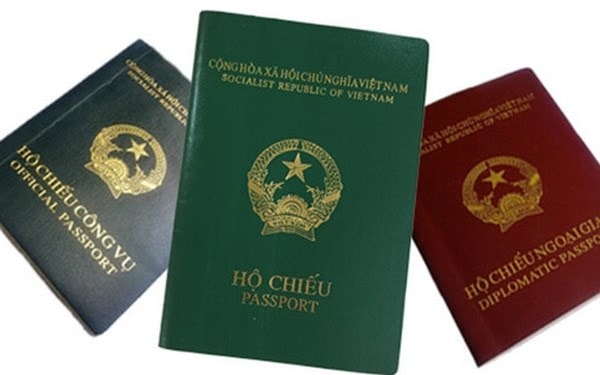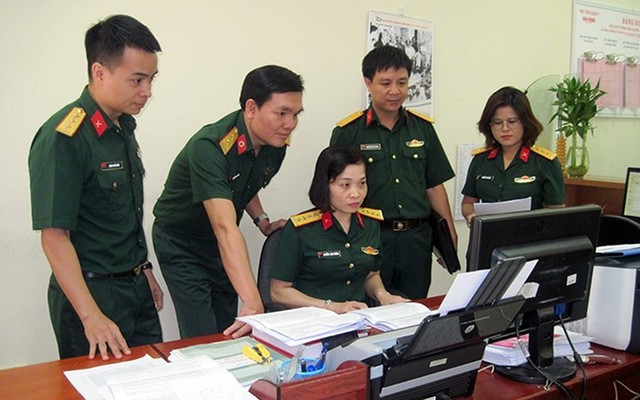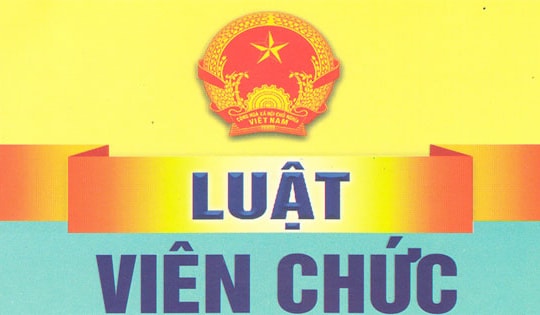New policies effective from March 2023
(Baonghean.vn) - Issuing ordinary passports with electronic chips to citizens; tightening management in receiving donations; increasing in-kind compensation for dangerous and toxic jobs... are policies that will take effect from March 2023.
Issuing ordinary passports with electronic chips to Vietnamese citizens
From March 1, 2023, the Ministry of Public Security will issue ordinary passports with electronic chips to citizens in accordance with the Law on Exit and Entry of Vietnamese Citizens. Accordingly, passports with electronic chips are a prerequisite and a basis for automating border control, facilitating travel and entry between countries. People with electronic chip passports will be given priority by foreign countries when considering granting entry visas.
|
Image of new electronic chip passport. |
In terms of appearance, the electronic chip passport is basically the same as the non-electronic chip passport with a dark blue cover, the pages in the passport are beautiful landscapes of the country, Vietnamese cultural heritage. All content and images printed in the passport are made using modern technology to meet security requirements, prevent the risk of counterfeiting and meet ICAO standards. To distinguish it from the non-electronic chip passport, on the first cover page of the electronic chip passport there is an electronic chip symbol. The electronic chip is placed on the back cover of the passport to store personal information and biometric information of the passport holder (including facial photo, fingerprints, etc.) and the digital signature of the passport issuing authority.
Ordinary passports without electronic chips and ordinary passports with electronic chips are used simultaneously. When submitting passport applications, Vietnamese citizens aged 14 and over have the right to choose to be issued a passport without electronic chips or a passport with electronic chips (the passport application form already has a passport type option for citizens to fill in themselves). Vietnamese citizens who have been issued ordinary passports without electronic chips will continue to use them until the passport expires, and are not required to change to a passport with electronic chips.
Tighten management in receiving donations and sponsorships
According to Circular 04/2023/TT-BTC, from March 19, 2023, the unit assigned by the festival organizing committee to receive, manage and use funds for festival organization is responsible for opening a deposit account at the State Treasury or a commercial bank to reflect the receipt, management and use of donations and sponsorship for relics and festival activities in the form of bank transfer and electronic payment methods.
Regarding cash receipts, assign a person to receive them and open a book to record the total amount of money received. For money in the donation box, periodically count it daily or weekly and record the total amount of money received. Amounts of money that are not placed in the right place or are not suitable for the implementation of civilized lifestyle at the relics are collected for counting or put into the donation box for general counting. For cash that is temporarily unused, deposit it into an account opened at the State Treasury or a commercial bank to ensure safe and transparent management of donations and sponsorships for relics and festival activities that have been received.
Regarding the receipt of valuable papers, religious establishments shall open a book to record the names of valuable papers, the amounts recorded on the valuable papers, and the issuing organizations. Regarding the receipt of precious metals and gemstones, religious establishments shall also open a book to record the names of precious metals and gemstones and their corresponding values according to the documents provided by the donating or donating organizations and individuals.
Guidance on “legitimate reasons” for being absent from military service examination
Officially effective from March 14, 2023, Circular 07/2023/TT-BQP clearly stipulates cases considered to have "legitimate reasons" to not be fined for being absent from the military service health examination, not being present at the correct time or place stated in the military service call-up order, etc.
Specifically, a person who must undergo a medical examination or health check for military service; a medical examination for selection of reserve officers... but is sick, has an accident, or is sick or has an accident on the way and must be treated at a medical facility. Relatives of a person performing military service include: biological father, biological mother; father-in-law, mother-in-law or father-in-law, mother-in-law; adoptive father, adoptive mother; legal guardian; wife/husband; biological child, legally adopted child who is sick or has a serious accident and is being treated at a medical facility. Relatives of a person performing military service who dies but has not yet held a funeral or the funeral has not yet ended.
The residence of a person performing military service or the residence of a relative of a person performing military service is located in an area that is seriously affected by natural disasters, epidemics, or fires. The person performing military service does not receive orders or receives orders but the orders do not specify the time and location due to the fault of the responsible person or agency, or due to obstruction by others.
Increase in-kind compensation for dangerous and toxic work
According to Circular 24/2022/TT-BLDTBXH, from March 1, 2023, the level of in-kind compensation for employees working in hazardous and toxic conditions will be calculated according to the daily rate and have the following monetary value: level 1: 13,000 VND, level 2: 20,000 VND, level 3: 26,000 VND, level 4: 32,000 VND (increases of 3,000 VND, 5,000 VND, 6,000 VND, 7,000 VND respectively compared to the current compensation levels).
If the employee works 50% or more of the normal working hours of a working day, he/she is entitled to the full allowance. If the employee works less than 50% of the normal working hours of a working day, he/she is entitled to half of the allowance. In case the employee works overtime, the allowance in kind is increased corresponding to the number of overtime hours according to the above principle.
Circular 24/2022/TT-BLDTBXH also clearly states that allowances cannot be paid in cash or in lieu of in-kind allowances. In-kind allowances must be organized during shifts and working days, ensuring convenience, safety, and food hygiene. In cases where employees do mobile, dispersed work, work with few people, or other jobs with unstable labor organization that cannot be organized centrally on-site, employers must provide in-kind allowances to employees so that employees are responsible for self-supply according to regulations.
Appointment and dismissal of members of the Board of Management in public service units in the financial sector
Circular No. 11/2023/TT-BTC of the Ministry of Finance providing guidance on the Board of Management and standards and conditions for appointment and dismissal of members of the Board of Management in public service units in the financial sector takes effect from March 31, 2023.
According to the Circular, the structure of the Management Council includes: Representatives of the superior management agency of the public service unit, including representatives of ministries, ministerial-level agencies, agencies under the Government, organizations established by the Government or the Prime Minister that are not public service units, the Provincial People's Committee and the direct superior management agency (if any); the head of the public service unit; officials of the public service unit; representatives of relevant organizations and units.
The number of members of the Management Board ranges from 05 to 11 people, including the Chairman of the Management Board, the Secretary of the Management Board and the members of the Management Board. Depending on the requirements of the tasks, the Management Board may have a Vice Chairman of the Management Board. The number and structure of members of the Management Board of each specific public service unit are decided by the head of the competent authority approving the Autonomy Project of the public service unit.
The Chairman of the Management Board is selected and appointed by the head of the competent authority approving the Autonomy Project of the public service unit from the leadership representative of the public service unit or the representative of the superior management agency of the public service unit.
The term of office of a member of the Board of Directors shall not exceed 05 years.
The functions, tasks and powers of the Board of Management shall be implemented in accordance with the provisions of Clause 3, Article 7 of Decree No. 120/2020/ND-CP.
From March 15, 7 positions will periodically change to the field of science and technology in the locality.
Circular 20/2022/TT-BKHCN of the Ministry of Science and Technology stipulating the List and period for periodic job transfer in agencies, organizations and units in the field of science and technology at local authorities takes effect from March 15, 2023.
The Circular clearly states that the list of positions periodically converted to the field of science and technology at the local level includes:
1- Management of scientific and technological research tasks:
+ Receive and process documents to identify, order, select, directly assign, evaluate, and accept scientific and technological tasks;
+ Receive and process dossiers for appraisal of science and technology task funding;
+ Check and evaluate the implementation process and post-acceptance of scientific and technological tasks using the state budget;
+ Appraisal and issuance of certificates of registration of results of implementation of scientific and technological tasks.
2- Appraisal, technology appraisal of investment projects and technology transfer:
+ Appraisal and technology appraisal of investment projects according to legal regulations;
+ Appraisal of technology transfer registration certificates, issuance of registration certificates for renewal, amendment and supplementation of technology transfer content.
3- Radiation and nuclear safety activities:
+ Manage and implement the reception of declarations, safety assessment, licensing, amendment, supplementation, extension, and re-issuance of licenses to conduct radiation work using diagnostic X-ray equipment in medicine;
+ Granting radiation worker certificates to safety officers at medical diagnostic X-ray facilities.
4- Intellectual property activities
Appraisal, re-issuance and revocation of Certificates of industrial property appraisal organizations according to law provisions.
5- Quality measurement standard activities:
+ Appraisal of dossiers for granting certificates, confirmations, and licenses in the field of quality measurement standards according to regulations;
+ Appraisal and issuance of certificates of registration for the field of activities of considering and awarding product and goods quality awards of organizations and individuals; Appraisal of registration dossiers for participation in the National Quality Awards of organizations and enterprises at the Preliminary Selection Council stage.
6- Appraisal, issuance, extension, amendment, supplement, revocation, and cancellation of Certificates of registration for scientific and technological activities; Certificates of scientific and technological enterprises. Appraisal of dossiers for establishment of scientific and technological organizations; issuance of certificates of operation of representative offices and branches of scientific and technological organizations.
7- Cooperation and exchange of science and technology with foreign elements.
The Circular clearly states that the period for periodic job transfer for civil servants and public employees directly involved in and handling the above-mentioned work is from 2 to 5 years. The time for calculating the job transfer period is the time when there is a document on transfer, arrangement, and assignment of tasks from the competent authority according to the provisions of law.
List and period of periodic job transfer in the field of information and communication
Circular 01/2023/TT-BTTTT of the Ministry of Information and Communications stipulating the list and period for periodic job transfer in the field of information and communication at local authorities takes effect from March 17, 2023.
The Circular stipulates that the period for periodic job position transfer prescribed in Article 4 of this Circular is from 03 years (36 months) to 05 years (60 months) excluding internship and probationary period.
The time to calculate the job transfer period is the time when there is a document on transfer, arrangement and assignment of tasks from the competent authority according to regulations.
In addition, the Circular clearly states the list of positions periodically converted in the field of information and communication technology at local authorities.
10 leadership and management positions in the banking industry
Circular 21/2022/TT-NHNN guiding leadership and management positions and specialized professional titles in public service units in the banking sector takes effect from March 1, 2023.
The Circular clearly states that leadership and management positions and specialized professional titles in public service units in the Banking sector are determined on the basis of the principles prescribed in Article 3 of Decree No. 62/2020/ND-CP dated June 1, 2020 of the Government on job positions and civil servant payroll.
The basis for determining leadership and management positions and specialized professional titles in public service units in the Banking sector is implemented according to the provisions of Clause 1, Article 4 of Decree No. 62/2020/ND-CP.
The Circular clearly states 10 leadership and management positions in public service units in the Banking sector, including:
- Chairman of the Board of Directors;
- Member of the Board of Directors;
- General Director;
- Deputy General Manager;
- Department heads and equivalent;
- Deputy Head of Department and equivalent;
- Branch manager;
- Deputy Branch Director;
- Head of Department and equivalent directly under the Branch;
- Deputy Head of Department and equivalent directly under the Branch.
In addition, the Circular also clearly states the contents of job descriptions including: Job position objectives; tasks and evaluation criteria; work relationships; scope of authority; requirements on qualifications and capacity...
|
According to new regulations in Circular No. 10/2023/TT-BQP, the standards for enforcement officers have been shortened, no longer including foreign language and information technology standards.
Standards for military bailiffs
Circular No. 10/2023/TT-BQP amending and supplementing a number of articles of Circular No. 19/2018/TT-BQP of the Minister of National Defense regulating the titles of officers of the Military Enforcement Sector, effective from March 16, 2023.
According to the old regulations in Circular No. 19/2018/TT-BQP, primary enforcement officers must have a foreign language certificate with a level equivalent to level 2 of the Vietnamese foreign language competency framework as prescribed in Circular No. 01/2014/TT-BGDDT of the Ministry of Education and Training promulgating the 6-level foreign language competency framework for use in Vietnam; have an IT certificate with a level meeting the standard of basic information technology skills as prescribed in Circular No. 03/2014/TT-BTTTT of the Ministry of Information and Communications regulating the standard of information technology skills; have a certificate of training and professional development for primary enforcement officers.
Intermediate enforcement officers must have a foreign language certificate with a level equivalent to level 3 of the Vietnamese foreign language competency framework as prescribed in Circular No. 01/2014/TT-BGDDT of the Ministry of Education and Training promulgating the 6-level foreign language competency framework for use in Vietnam; have an IT certificate with a level meeting the standard of basic information technology skills as prescribed in Circular No. 03/2014/TT-BTTTT of the Ministry of Information and Communications regulating the standard of information technology skills; have a certificate of training and professional development for Intermediate Enforcement Officers.
Senior enforcement officers are the Heads and Deputy Heads of military region-level enforcement agencies; have advanced political theory qualifications; have a foreign language certificate equivalent to level 4 of the Vietnamese foreign language competency framework as prescribed in Circular No. 01/2014/TT-BGDDT of the Ministry of Education and Training promulgating the 6-level foreign language competency framework for use in Vietnam; have an IT certificate with a level that meets the basic information technology skills standards as prescribed in Circular No. 03/2014/TT-BTTTT of the Ministry of Information and Communications regulating information technology skills standards; have a certificate of training and professional development for Senior Enforcement Officers.
No more foreign language and IT standards
According to new regulations in Circular No. 10/2023/TT-BQP, the standards for enforcement officers have been shortened, no longer including foreign language and information technology standards.
Specifically, primary enforcement officers must meet the standards prescribed in Clause 5, Article 18 of the Law on Civil Judgment Enforcement and Article 4 of this Circular; have a certificate of training in state management knowledge and civil judgment enforcement skills according to the content and program of the Ministry of Justice.
Intermediate enforcement officers must meet the standards prescribed in Clause 5, Article 18 of the Law on Civil Judgment Enforcement and Article 4 of this Circular; have a certificate of training in state management knowledge and civil judgment enforcement skills according to the content and program of the Ministry of Justice.
Senior enforcement officers must meet the standards prescribed in Clause 5, Article 18 of the Law on Civil Judgment Enforcement and Article 4 of this Circular; have a diploma of advanced political theory or advanced political-administrative theory or a bachelor's degree in politics or a certificate of theoretical level equivalent to advanced political theory as prescribed; have a certificate of training in knowledge of state management and advanced civil judgment enforcement according to the content and program of the Ministry of Justice.




.jpg)





